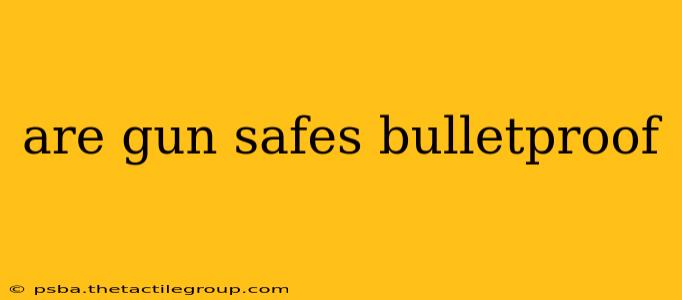The question, "Are gun safes bulletproof?" is a common one, and the answer is nuanced. While the term "bulletproof" implies complete protection against all firearms, gun safes aren't designed with that level of protection as their primary function. Their purpose is primarily to deter theft and unauthorized access, offering varying degrees of protection against forced entry. However, their resistance to bullets depends on several factors. Let's delve into the details.
Understanding Gun Safe Construction and Security Ratings
Gun safes are constructed from various materials, primarily steel, with varying thicknesses and reinforcement techniques. The thickness of the steel, the type of locking mechanism, and the presence of additional security features like fireproofing all influence their overall security. Many safes are rated according to specific standards, such as those set by Underwriters Laboratories (UL). These ratings indicate the safe's resistance to different types of attacks, including physical attacks like pry bars and drilling, but not necessarily bullets.
Key Factors Affecting Bullet Resistance:
- Steel Thickness: Thicker steel offers greater resistance to both physical attacks and bullets. However, even thick steel might not withstand high-caliber rounds.
- Steel Type: The type of steel used impacts its hardness and resistance to penetration. Higher-grade steel alloys are more effective.
- Reinforcement: Features like reinforced doors, rebar, and hard plates enhance the safe's structural integrity and resistance to both physical attacks and projectiles.
- Fire Resistance: Many gun safes offer fire protection, but this is separate from bullet resistance. Fire-resistant safes often incorporate insulation and heat-resistant materials.
How Gun Safes Perform Against Firearms:
A gun safe might offer some level of protection against bullets, depending on the factors mentioned above and the caliber and type of ammunition used. A low-caliber handgun round might be stopped by a very thick, high-quality safe, but a high-powered rifle round would likely penetrate most standard gun safes.
Think of it this way: gun safes are designed to keep unauthorized individuals from accessing your firearms; they are not designed as personal ballistic shields.
What to Consider Instead of "Bulletproof":
Instead of focusing on the misleading term "bulletproof," consider these aspects of gun safe security:
- Fire Resistance Rating: This indicates how long the safe can protect its contents from fire damage.
- Security Rating: Check for UL ratings or similar certifications to assess the safe's resistance to physical attacks.
- Locking Mechanism: Choose a safe with a high-quality locking mechanism, such as a combination lock or electronic lock, that is resistant to picking and tampering.
- Size and Capacity: Select a safe that is large enough to accommodate your firearms and other valuables while maintaining portability if required.
Conclusion: Prioritize Safe Selection Based on Intended Use
While a gun safe might offer some incidental protection against certain projectiles, it is not a substitute for body armor or ballistic shielding. The priority when selecting a gun safe should be its ability to deter theft and unauthorized access, its fire resistance, and the quality of its locking mechanism. Focusing on a realistic assessment of its security features, based on its ratings and construction, will lead you to a more suitable and effective choice for protecting your firearms.

